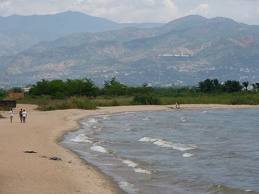 |
| Bujumbura, Burundi viewed from the Lake Tanganyika Beaches |
I’ve always
thought of Rwanda as a Francophone country. While I’ve been aware of the
Rwandan government’s attempts to begin to switch the language of higher
education to English, I was not prepared for the overwhelming Anglicizing that
has happened here. Driving through the streets of Kigali, French is likely the
third most prominent language, following English (probably 80% of all signage)
and Kinyarwanda, the national language. While walking through the market today,
most people addressed me in English. This country is in the midst of a major
linguistic (and geo-political) shift.
Rwanda (along
with neighboring Burundi) is a linguistic oddity in Africa. Both nations are
linguistically homogenous with only one national language – Kinyarwanda or
Kirundi – which are themselves mutually intelligible. They lack the linguistic
mosaic that characterizes nearly every other African nation. Both were German
colonies in the late nineteenth century and then came under Belgian rule from
World War I until the 1960s, entrenching French as the language of education.
With the uneasy relationship between Rwanda and France following 1994, Rwanda
has made a strong move toward Anglophone East Africa, going so far as to join
the Commonwealth.
I struggle to
think of another recent situation in the world where a country has quite
literally switched its major educational language. Certainly in the aftermath
of 1991, the former Soviet republics moved toward reclaiming their national
languages. Yet this was a political change. The populations, for the most part,
already spoke their languages and most of them had been used to some degree in education
at some point in the Soviet Union. This is not the case with English for most
of the Rwandan population. I’m told that university professors and secondary
school teachers are teaching in English while still learning English. Certainly
this creates a bit of national linguistic dissonance.
The situation
in Burundi is much more complex. Although the city is much more “Francophone”
on the surface (I saw very little English signage, even at the airport, more
like Francophone West Africa), it is clear that the professional and educated
classes are increasingly learning English. Several universities are teaching in
English, although seemingly with a transition at a slower rate than Rwanda.
While Burundi has joined the English-speaking East African Community, it
clearly intends to keep one foot in the French world as well. Interestingly, I
saw nothing written about “Afrique de l’est”. Rather, it was always “l’East
Africa”.
Listening
carefully to several indirect conversations today, it was clear that Rwandans and
Burundians are not unused to linguistic mixing. The predominantly vernacular conversations
were peppered with Swahili, English, and French phrases. This is yet another
place where identity – and language as a key marker – is very complex.
I'd say in closing that both Kigali and Bujumbura and their surroundings were among the most beautiful places I have visited in terms of topography. Bujumbura, in particular, with the drama of the Lake Tanganyika shore, the climbing hills to the west and the dramatic mountains of Congo to the east, is a very striking place. Kigali was a more bustling city than rather sleepy Bujumbura. Both are worthy of much more exploration.
Language is so incredibly tied to issues of identity, isn't it? I think of Ukraine, where recent legislation has dealt on language issues. Even in the US, we continue to struggle with the role of Spanish in our society. I think also of the use of Russian in Latvia. And, how about Belgium, where French and Flemish are politicized. What a world! Thanks for your thoughts, Jason.
ReplyDelete